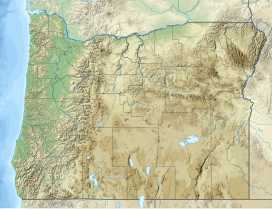Trask Mountain
| Trask Mountain | |
|---|---|
| Highest point | |
| Elevation | 3,426 ft (1,044 m) NAVD 88[1] |
| Prominence | 3,424 ft (1,044 m)[2] |
| Listing | Oregon county high points |
| Coordinates | 45°22′16″N 123°27′21″W / 45.371236781°N 123.455773206°W[1] |
| Geography | |
| Location | Yamhill County, Oregon, U.S. |
| Parent range | Northern Oregon Coast Range |
| Topo map | USGS Trask Mountain |
| Climbing | |
| Easiest route | Trask Toll Road to just below the summit.[3] |
Trask Mountain in the Northern Oregon Coast Range, is the tallest mountain in Yamhill County, Oregon.[4] It is located in the northwest corner of the county.[5] Evidently the mountain was named for Elbridge Trask who settled west of the peak in Tillamook County in 1852.
Geology
[edit]The mountain is composed of mainly volcanic rock with some sedimentary rocks.[6] Like much of the northern section of the Oregon Coast Range, the origins began around 40 million years ago during the Eocene period. During this era, sandstone and siltstone formed in the area.[7] Additionally, igneous rocks and basalt flows combined with basaltic sandstone to create many of the mountainous formations. The volcanic rocks come from basalt flows that originated from fissures in the central portion of Oregon and covered much of the state.[8] Additional sedimentary rock was formed more recently, around 20 million years ago.[7]
All of the coast range lies over a convergent tectonic margin interacting with the Juan de Fuca Plate that is subducting beneath North America tectonic plate in the Cascadia subduction zone.[9] The mountains are created by the plunging structural arch of sedimentary and Tertiary volcanic strata that is being uplifted.[8]
Flora and fauna
[edit]Vegetation in the area includes Sitka spruce, Douglas-fir, western hemlock, western redcedar, salmonberry, red alder, western sword fern, and vine maple among many others.[10] Other plant life native to the mountains are Coptis laciniata, salal, Oregon-grape, and bracken fern.[11][12][13]
Different insects can include spiders, beetles, and various centipedes.[11][13] Mammals include weasels, chipmunks, black bears, hares and deer.[11] Birds include kinglets, chickadees, woodpeckers, and jays.[11]
Other
[edit]In the northwest part of the county, the mountain is in private forest land owned by Weyerhaeuser.[14] Trask Mountain makes up a portion of the North Yamhill River headwaters that drain to the Willamette River.[6] On its north side, drainage is to the Trask River which flows west to the Pacific Ocean.[10] The mountain receives over 135 inches (3,400 mm) of precipitation each year.[6] The mountain is home to a U.S. Geologic Survey seismograph station that was installed in 1991.[15] Previously, the peak was home to a fire lookout station that was abandoned in the 1970s.[16] There are plans to construct a 50 Megawatt wind power facility atop the mountain beginning in 2009.[17]
In 1997, Dundee, Oregon, resident Lee John Knoch beat Robert Allen Holliday nearly to death and buried him alive on Trask Mountain.[18]
See also
[edit]References
[edit]- ^ a b "Trask Reset". NGS Data Sheet. National Geodetic Survey, National Oceanic and Atmospheric Administration, United States Department of Commerce. Retrieved 2008-11-07.
- ^ "Trask Mountain". Peakbagger.com. Retrieved 2008-04-03.
- ^ Jones, Ken. "Yamhill County high Point Trip Report". County highpointers. Retrieved 2008-04-03.
- ^ "Oregon County High Points". Peakbagger.com. Retrieved 2008-04-03.
- ^ "Trask Mountain". Geographic Names Information System. United States Geological Survey, United States Department of the Interior. Retrieved 2008-11-07.
- ^ a b c "North Yamhill Watershed" (PDF). Yamhill County. Archived from the original (PDF) on 2007-09-27. Retrieved 2008-04-03.
- ^ a b "Upper Nehalem Watershed Analysis" (PDF). Oregon Department of Forestry. Archived from the original (PDF) on 2006-12-03. Retrieved 2008-04-03.
- ^ a b "Geologic Map of the Tillamook Highlands, Northwest Oregon Coast Range". U.S. Geological Survey. Retrieved 2008-04-03.
- ^ "Geology of the Luckiamute River Watershed, Upper Willamette Basin, Polk and Benton Counties, Oregon" (PDF). Western Oregon University. Archived from the original (PDF) on 2012-02-07. Retrieved 2008-04-03.
- ^ a b "ODF: Trask River Watershed" (PDF). Oregon Department of Forestry. Archived from the original (PDF) on 2012-02-12. Retrieved 2008-04-03.
- ^ a b c d Macnab, James A. (January 1958). "Biotic Aspection in the Coast Range Mountains of Northwestern Oregon". Ecological Monographs. 28 (1). Ecological Monographs, Vol. 28, No. 1: 21–54. doi:10.2307/1942274. JSTOR 1942274.
- ^ "Management Recommendations for Spleenwort-leaved Goldthread". Bureau of Land Management. Retrieved 2008-03-31.
- ^ a b "From the Forest to the Sea: A Story of Fallen Trees". Tree Dictionary. Retrieved 2008-03-31.
- ^ Howbert, Jeff. "Yamhill County High Point 2". County Highpointers. Retrieved 2008-03-31.
- ^
"Seismograph Station Codes Listed Alphabetically: T." U.S. Geological Survey. Archived from the original on 2006-04-19. Retrieved 2008-03-31.
{{cite web}}: CS1 maint: bot: original URL status unknown (link) - ^ McOmie, Grant. "When 'Cloud Girls' watched over the woods". katu.com. Archived from the original on 2007-09-27. Retrieved 2008-03-31.
- ^ "Trask Mountain: Yamhill County, Oregon". Everpower Renewables. Retrieved 2008-03-31.
- ^ Tims, Dana (March 28, 1998). "Dundee man guilty of 1997 murder". The Oregonian. Portland, Oregon.
External links
[edit]- "Picture of lookout tower in 1980s". flickr.com. Retrieved 2008-04-03.

